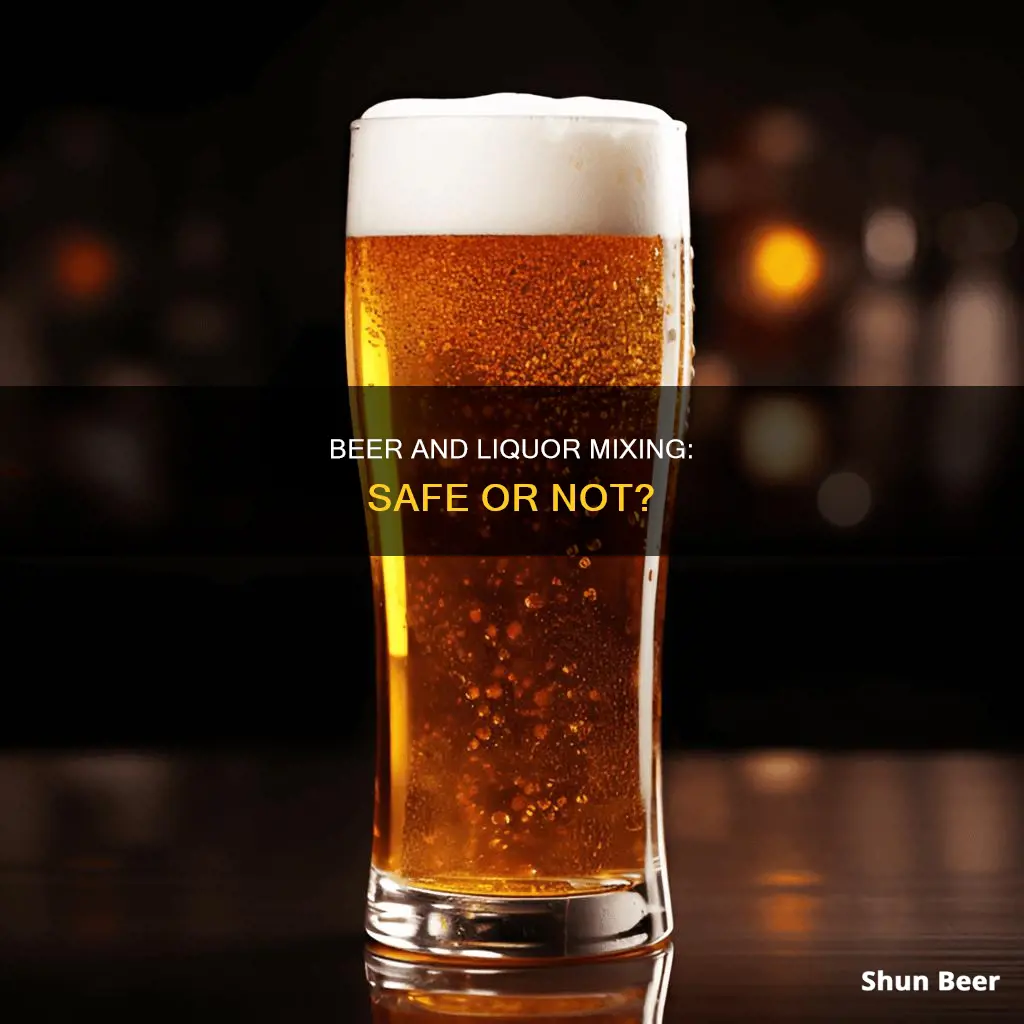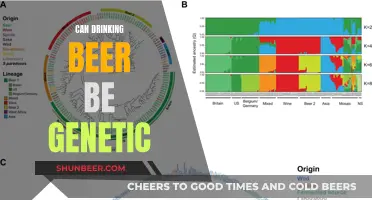
There is a popular saying that goes beer before liquor, never been sicker; liquor before beer, you're in the clear. This saying suggests that drinking liquor after beer can worsen hangover symptoms. However, modern research has disproven this myth. The order in which alcoholic beverages are consumed does not influence the severity of a hangover. Instead, the amount of alcohol consumed is the main factor that determines the severity of a hangover. Other factors that contribute to hangover symptoms include acetaldehyde, a toxic alcohol byproduct, disrupted sleep patterns, and combining alcohol with other substances.
| Characteristics | Values |
|---|---|
| Whether drinking order affects hangover severity | No, it is a myth. |
| Factors that affect hangover severity | Amount of alcohol, whether you ate, how frequently you drink, genetics, congeners, smoking |
| How to prevent a hangover | Drinking in moderation, staying hydrated, getting enough sleep |
What You'll Learn

The order of drinks does not affect hangover severity
The popular saying goes, "beer before liquor, never been sicker; liquor before beer, you're in the clear." This implies that drinking beer before liquor will make you feel worse, and that the order of drinks affects how bad your hangover will be. However, this is just a myth, and there is no scientific evidence to support it. Research has shown that the order of drinks does not affect hangover severity.
The idea that drinking beer before liquor will make you sicker is based on a few factors. Firstly, most people start their evenings with drinks that have a lower alcohol content, such as beer, and move on to liquor as the night progresses. So, if they get sick at the end of the night or feel terrible the next morning, they may blame it on drinking beer before liquor. Secondly, liquor has a high alcohol content, which is more likely to spike your blood alcohol levels quickly compared to beer. So, finishing the night with liquor after drinking beer can quickly push your already elevated blood alcohol content over the edge, contributing to a hangover.
However, the order of drinks is unlikely to influence whether you experience a hangover the next day. Alcohol starts being absorbed into your bloodstream as soon as it reaches your stomach. So, by the time a hangover kicks in, all the alcohol you consumed the night before will have been absorbed. As long as the total amount of alcohol you consume remains the same, there is no reason why drinking liquor before beer would protect against a hangover any more than drinking beer before liquor.
In fact, a 2019 study compared the hangover severities of subjects who drank only beer, only wine, beer and then wine, or wine and then beer. The results showed that "neither type nor order of consumed alcoholic beverages significantly affected hangover intensity." So, if you want to avoid a hangover, it's better to focus on factors such as staying hydrated, drinking in moderation, and getting enough sleep, rather than the order of your drinks.
Shanghai's Public Drinking Laws: Beer Allowed?
You may want to see also

Total alcohol volume consumed matters more than the type of drink
The popular saying "beer before liquor, never been sicker; liquor before beer, you're in the clear" suggests that the order in which alcoholic beverages are consumed can influence the risk and severity of a hangover. However, modern research has debunked this myth, indicating that the order of consumption does not significantly affect hangover intensity. Instead, it's the total alcohol volume consumed that matters more than the type of drink.
The amount of alcohol consumed has a more significant impact on the likelihood and severity of a hangover than the type of drink. A 2019 study found that neither the type nor the order of alcoholic beverages affected hangover intensity. This means that regardless of whether you drink beer before or after liquor, the total amount of alcohol consumed is what determines the likelihood of a hangover.
The volume of alcohol consumed also influences the rate of consumption. For example, it takes longer to drink a bottle of beer than a cocktail or a shot due to its larger volume. Therefore, drinking beer results in a lower alcohol consumption rate per minute compared to cocktails. However, this difference in consumption rate does not alter the total alcohol volume consumed, which remains the primary factor influencing the risk of a hangover.
Additionally, the absorption rate of alcohol in the body varies depending on how it is prepared. A 2007 study found that diluted vodka was absorbed faster than vodka served neat. This suggests that even if the same amount of time is taken to consume the same absolute amount of alcohol, the preparation method can impact the level of intoxication. However, this factor still reinforces the importance of total alcohol volume consumed over the type of drink.
While the specific order of beer and liquor consumption may not significantly affect hangover severity, it is worth noting that drinking in moderation and staying hydrated are crucial to reducing the risk and severity of hangovers. Responsible drinking, pacing, and alternating alcoholic beverages with water are recommended to mitigate the negative effects of alcohol consumption.
Beer and the HCG Diet: What You Need to Know
You may want to see also

Carbonation in beer and sparkling drinks can increase alcohol absorption
Carbonation is a solution of carbon dioxide gas in water. The carbon dioxide is generally kept in the water under pressure (either in a bottle or in a natural spring) and will slowly release once that pressure is relieved, forming carbon dioxide gas bubbles. Carbonation occurs naturally in some mineral springs, producing naturally carbonated spring waters. Carbonation also occurs as a byproduct of fermentation, which is why many alcoholic beverages naturally become carbonated in the bottle.
Carbonation can speed up the rate of alcohol absorption, meaning you might feel the effects of bubbly alcoholic beverages faster compared to flat drinks. Some studies show that carbonation in drinks like champagne speeds up the rate of alcohol absorption anywhere from 40-50%. However, it's important to note that the studies on this topic are limited, and the results are not conclusive.
Carbonation creates pressure in the stomach, which accelerates gastric emptying, allowing alcohol to move to the small intestine more quickly. There is a muscular valve at the bottom of the stomach called the pyloric sphincter that opens to let food and drink pass through to the small intestine. Carbonation and bloating might cause this valve to open prematurely, letting alcohol enter the small intestine faster than it would without bubbles.
While carbonation may cause you to feel the effects of alcohol faster, it does not make you more drunk overall. After some time, the effects even out, and the drunkest person in the room will usually be the one who consumed the largest amount of alcohol, regardless of whether it was bubbly or not.
Other factors, such as drinking on an empty stomach, high alcohol content, drinking speed, and gender, also play a significant role in how quickly you feel the effects of alcohol consumption.
Beer and Aleve: Safe Mix or Health Risk?
You may want to see also

Drinking water is key to avoiding a hangover
There are many theories about how to avoid a hangover, but most of them are just myths. For example, the popular saying "beer before liquor, never sicker; liquor before beer, you're in the clear" is not based on scientific evidence. The order in which you consume your drinks is unlikely to influence whether you experience a hangover the next day. Instead, the total amount of alcohol you consume is the key factor.
Drinking water is often touted as a way to prevent a hangover, but does it actually work? Let's take a look at the evidence.
Drinking Water to Prevent a Hangover
While staying hydrated is important, simply drinking water may not be enough to prevent a hangover. A study of over 800 students found that drinking water while consuming alcohol and before bed did not significantly reduce the severity of hangovers. However, it is worth noting that those who drank water did show a slight improvement in how they felt compared to those who didn't.
Other Factors Affecting Hangovers
- Amount of alcohol: The more alcohol you drink, the more likely you are to experience a hangover.
- Food consumption: Drinking on an empty stomach can cause alcohol to be absorbed more quickly, leading to higher blood alcohol levels and an increased risk of a hangover. Eating before or while drinking can help slow the absorption of alcohol.
- Frequency of drinking: Heavy drinkers or those with a family history of alcoholism may be more prone to hangovers.
- Genetics: Your genes can affect how your body metabolizes alcohol, influencing the severity of hangover symptoms.
- Congeners: Dark-colored alcoholic beverages contain higher levels of congeners, which are compounds that can contribute to worse hangovers.
- Smoking: People who smoke may experience hangovers more frequently than non-smokers.
Tips for Avoiding a Hangover
While there is no guaranteed way to completely avoid a hangover, here are some tips that may help:
- Drink in moderation: The best way to avoid a hangover is to limit your alcohol consumption.
- Stay hydrated: Drinking water throughout the evening and the next morning can help with hydration levels, which is important as alcohol can cause dehydration.
- Avoid rounds: Drinking in rounds can make it harder to keep track of how much you're consuming and may lead to drinking more than intended.
- Prioritize sleep: Alcohol can disrupt sleep patterns, so getting a good night's rest after drinking can help reduce hangover symptoms.
- Choose lower-alcohol options: Opting for drinks with lower alcohol content, such as clear liquors like vodka and gin, may reduce the risk of a hangover.
In summary, while drinking water is important for staying hydrated, it may not be the magic bullet for preventing a hangover. The key to avoiding a hangover is to drink in moderation, pace yourself, and be mindful of the factors that can influence the severity of hangover symptoms.
Drinking Beer on the Porch: Legal or Not?
You may want to see also

Drinking on an empty stomach is not recommended
Drinking on an empty stomach can lead to a faster onset of side effects such as impaired coordination, slowed brain function, and listlessness. It can also increase the risk of alcohol poisoning, which can be fatal. Alcohol poisoning is indicated by hypothermia (low body temperature), loss of coordination, slow or abnormal breathing, stupor, and unconsciousness. If you suspect someone has alcohol poisoning, call emergency services immediately.
Additionally, drinking on an empty stomach can increase the risk of a hangover. To reduce the risk of a hangover, it is recommended to eat before drinking and to stay hydrated by alternating between alcoholic beverages and water. It is also important to prioritize sleep, as alcohol disrupts sleep patterns, which can contribute to grogginess and fatigue the next day.
In summary, drinking on an empty stomach can lead to a faster absorption of alcohol and more rapid onset of side effects. It increases the risk of alcohol poisoning and hangovers. To drink more safely, it is recommended to eat before drinking, stay hydrated, and get sufficient rest.
Exploring Beer Enhancement With Bazooka Tubes
You may want to see also
Frequently asked questions
Yes, you can drink liquor after drinking beer. The order in which you consume your drinks is unlikely to influence whether you experience a hangover the next day.
Alcohol begins to be absorbed into your bloodstream as soon as it reaches your stomach. Thus, all the alcohol you drank will have been absorbed before your hangover takes effect.
The only way to completely prevent a hangover is to not drink alcohol or to drink in moderation. Staying hydrated by drinking water, drinking in moderation, getting plenty of sleep, and eating before drinking alcohol can also help prevent a hangover.
No, the myth that "beer before liquor, never been sicker" is not true. The severity of a hangover depends on the amount of alcohol consumed, not the type or order of drinks.







